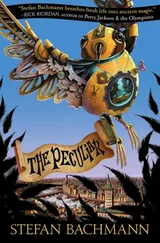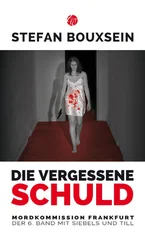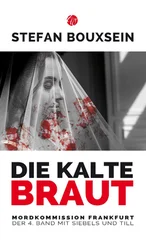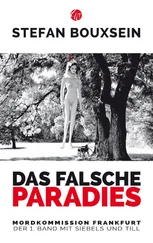Bartholomew forced himself through the gap and lay panting on the floor. It was hot under the slates of the roof. The sun hammered down outside, turning everything brittle and sharp, and after that mad rush up seventy-nine uneven steps to the tip of the house, he felt like a little loaf under the pointed gable, baking.
As soon as he had caught his breath, he crawled to the window. He could see across the alley and the high wall, directly into the Buddelbinsters’ yard. The lady was still there, a blot of purple amid the brown rooftops and scraggly, sunburnt weeds. The sour-looking woman had opened the door again. She appeared to be listening to the lady warily, her hands clamping and unclamping the gray braid that hung over her shoulder. Then the lady in plum was slipping her something. A little purse? He couldn’t see it properly. The sour one retreated back into the house, all hunched up and greedy, like a rat that has found a scrap of meat and is determined not to share it with anyone.
The instant the door closed, the lady in plum became a whirl of activity. She dropped to the ground, skirts pooling around her, and plucked something from inside her top hat. A small bottle caught the sunlight and glinted in her hand. She bit off the seal, uncorked it, and began dribbling its contents in a circle around her.
Bartholomew leaned forward, squinting through the thick glass. It occurred to him that he was likely the only one who could see her now. Other eyes had been following her since the moment she stepped into the alley. He knew that. But now the lady was deep in the yard, and any other watchers in the alley would see nothing but the high and crumbling wall. The lady in plum had chosen the Buddelbinster house on purpose. She didn’t want to be seen.
When the bottle was empty, she held it up and ground it between her fingers, letting the shards fall to the weeds. Then she rose abruptly and faced the house, looking as poised and elegant as ever.
Several minutes passed. The door opened again, a little uncertainly. This time a child stuck his head out. It was the boy, Bartholomew’s friend. Like Hettie, his faery blood showed clear as the moon through his white, white skin. A thicket of red thistles grew from his head. His ears were long and pointed. Someone must have shoved him from behind because he came tumbling out of the door and onto the ground at the lady’s feet. He stared up at her, eyes wide.
The lady’s back was toward Bartholomew, but he knew she was talking to the boy by the way he kept shaking his head in a small, fearful way. The boy glanced timidly back at his house. The lady took a step toward him.
Then a great many things happened at once. Bartholomew, staring so intently, nodded forward a bit so that the tip of his nose brushed against the windowpane. And the moment it did, there was a quick, sharp movement in the yard below, and the lady reached behind her and jerked apart the coils of hair at the back of her head. Bartholomew’s blood turned to smoke in his veins. There, staring directly up at him, was another face, a tiny, brown, ugly face like a twisted root, all wrinkles and sharp teeth.
With a muffled yelp, he scrabbled away from the window, splinters driving into his palms. It didn’t see me, it didn’t see me. It couldn’t ever have known I was here.
But it had. Those wet black eyes had looked into his. For an instant they had been filled with a terrible anger. And then the creature’s lips had curled back and it had smiled.
Bartholomew lay gasping on the floorboards, heart pounding inside his skull. I’m dead now. So, so dead. He didn’t look very much like a half-blood, did he? From down in the yard he would look like a regular boy. He pinched his eyes closed. A regular boy spying on her.
Very slowly he brought his head back level with the window, this time keeping deep in the shadows. The lady in plum had moved a little ways distant from the boy in the yard. Her other, hideous face was gone, hidden under her hair. One long, velvet-gloved hand was extended, beckoning.
The boy looked at her, looked back again at his house. For the shortest instant, Bartholomew thought he saw someone in one of the upper windows, a stooping shadow, hand raised against the pane in farewell. One blink later and it was gone, and the window was empty.
The boy in the yard shivered. He turned back to the lady. She nodded, and he moved toward her, taking her outstretched hand. She clasped him close. There was a burst of darkness, a storm of black wings flapping. It exploded up around them, screaming toward the sky. A ripple passed through the air. Then they were gone, and Old Crow Alley was sleeping once again.
Contents Cover Title Page Dedication Prologue Chapter I: The Most Prettiest Thing Chapter II: A Privy Deception Chapter III: Black Wings and Wind Chapter IV: Nonsuch House Chapter V: To Invite a Faery Chapter VI: Melusine Chapter VII: A Bad One Chapter VIII: To Catch a Bird Chapter IX: In Ashes Chapter X: The Mechanicalchemist Chapter XI: Child Number Ten Chapter XII: The House and the Anger Chapter XIII: Out of the Alley Chapter XIV: The Ugliest Thing Chapter XV: Goblin Market Chapter XVI: Greenwitch Chapter XVII: The Cloud That Hides the Moon Chapter XVIII: The Peculiar Copyright Конец ознакомительного фрагмента. Текст предоставлен ООО «ЛитРес». Прочитайте эту книгу целиком, купив полную легальную версию на ЛитРес. Безопасно оплатить книгу можно банковской картой Visa, MasterCard, Maestro, со счета мобильного телефона, с платежного терминала, в салоне МТС или Связной, через PayPal, WebMoney, Яндекс.Деньги, QIWI Кошелек, бонусными картами или другим удобным Вам способом. About the Publisher
 RTHUR Jelliby was a very nice young man, which was perhaps the reason why he had never made much of a politician. He was a member of Parliament not because he was particularly clever or good at anything, but because his mother was a Hessian princess very well connected and had gotten him the position while playing croquet with the Duke of Norfolk. So while the other officials were fairly bursting their silken waistcoats with ambition, plotting the downfall of their rivals over oyster dinners, or at the very least informing themselves on affairs of state, Mr. Jelliby was far more interested in spending long afternoons at his club in Mayfair, buying chocolates for his pretty wife, or simply sleeping until noon. Which is what he did on a certain day in August, and which is why the urgent summons to a Privy Council in the Houses of Parliament caught him completely unprepared.
RTHUR Jelliby was a very nice young man, which was perhaps the reason why he had never made much of a politician. He was a member of Parliament not because he was particularly clever or good at anything, but because his mother was a Hessian princess very well connected and had gotten him the position while playing croquet with the Duke of Norfolk. So while the other officials were fairly bursting their silken waistcoats with ambition, plotting the downfall of their rivals over oyster dinners, or at the very least informing themselves on affairs of state, Mr. Jelliby was far more interested in spending long afternoons at his club in Mayfair, buying chocolates for his pretty wife, or simply sleeping until noon. Which is what he did on a certain day in August, and which is why the urgent summons to a Privy Council in the Houses of Parliament caught him completely unprepared.
He stumbled down the stairs of his house on Belgrave Square, one hand trying to get the worst of the tangles out of his hair, the other struggling with the tiny buttons of his cherry-red waistcoat.
“Ophelia!” he called, trying to sound cheerful but not really succeeding.
His wife appeared in the doorway to the morning room, and he pointed an apologetic finger at the length of black silk that hung limply under his collar. “The valet’s off, and Brahms doesn’t know how, and I cannot do it on my own! Knot it up for me, darling, won’t you, and spare us a smile?”
“Arthur, you must not sleep so long,” Ophelia said sternly, coming forward to tie his cravat. Mr. Jelliby was a tall man, and broad-shouldered, and she rather small, so she had to stand on tiptoes to reach.
“Oh, but I need to set an example! Think of the headlines: ‘War averted! Thousands of lives saved! The English Parliament slept through its session.’ You’d find the world a far more pleasant place.”
Читать дальше
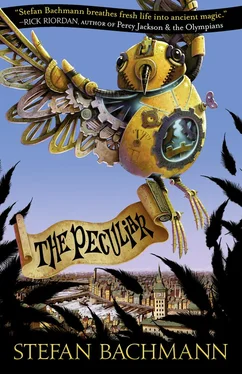
 RTHUR Jelliby was a very nice young man, which was perhaps the reason why he had never made much of a politician. He was a member of Parliament not because he was particularly clever or good at anything, but because his mother was a Hessian princess very well connected and had gotten him the position while playing croquet with the Duke of Norfolk. So while the other officials were fairly bursting their silken waistcoats with ambition, plotting the downfall of their rivals over oyster dinners, or at the very least informing themselves on affairs of state, Mr. Jelliby was far more interested in spending long afternoons at his club in Mayfair, buying chocolates for his pretty wife, or simply sleeping until noon. Which is what he did on a certain day in August, and which is why the urgent summons to a Privy Council in the Houses of Parliament caught him completely unprepared.
RTHUR Jelliby was a very nice young man, which was perhaps the reason why he had never made much of a politician. He was a member of Parliament not because he was particularly clever or good at anything, but because his mother was a Hessian princess very well connected and had gotten him the position while playing croquet with the Duke of Norfolk. So while the other officials were fairly bursting their silken waistcoats with ambition, plotting the downfall of their rivals over oyster dinners, or at the very least informing themselves on affairs of state, Mr. Jelliby was far more interested in spending long afternoons at his club in Mayfair, buying chocolates for his pretty wife, or simply sleeping until noon. Which is what he did on a certain day in August, and which is why the urgent summons to a Privy Council in the Houses of Parliament caught him completely unprepared.


